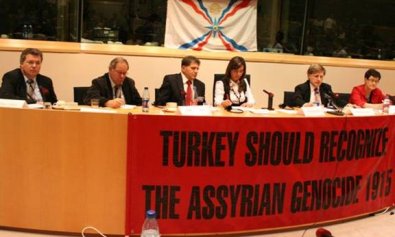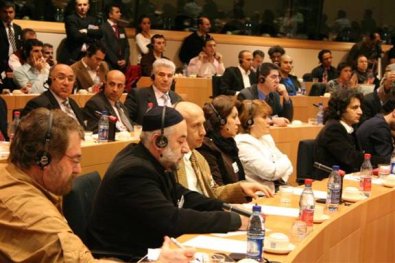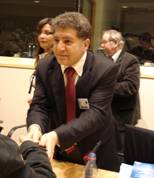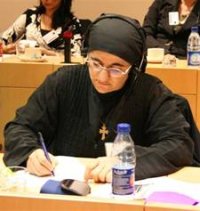

 Brussels (AINA) -- Days before the restart of Turkish EU membership talks, the European Parliament hosted a conference where Parliament members, scholars and international experts agreed that Turkey must come to terms with the 1915 genocide before EU membership.
Brussels (AINA) -- Days before the restart of Turkish EU membership talks, the European Parliament hosted a conference where Parliament members, scholars and international experts agreed that Turkey must come to terms with the 1915 genocide before EU membership.
The heavily attended March 26th event was hosted by the European parliamentary groups, European United Left, Nordic Green Left, and the Seyfo Center, an Assyrian institution working on increasing awareness of the 1915 genocide of the Assyrians, as well as Armenians, and Greeks by Turkey. The panel speakers included:
- Eva-Britt Svensson, GUE/NGL Politician and Member of the European Parliament
- Sabri Atman, Director of the Seyfo Center
- Prof. David Gaunt, Södertörns University College, Sweden
- Markus Ferber, EVP-ED, Member of the European Parliament, member of leading German party
- Willy Fautré, Director Human Rights Without Frontiers
 The first speaker, Ms. Svensson, called for Turkey's membership in the EU but not without first complying with the Copenhagen criteria regarding the 1915 genocide as well as the "unrestricted opening of Ottoman archives for the world to see". She further stated that "In a democratic environment, such issues should be discussed openly and not suppressed. Turkey should not be an exception."
The first speaker, Ms. Svensson, called for Turkey's membership in the EU but not without first complying with the Copenhagen criteria regarding the 1915 genocide as well as the "unrestricted opening of Ottoman archives for the world to see". She further stated that "In a democratic environment, such issues should be discussed openly and not suppressed. Turkey should not be an exception."
Sabri Atman, founder of the Seyfo Center, further agreed that the current Turkish position regarding the genocide and the silence by the EU countries is unacceptable.
"33% of the [Turkish] population was Christian. Today in Turkey, the total number of Christian people only amounts to 0.1% of the population. What happened to these people? What happened to the Assyrians, Armenians and Greeks? Where are they? Where did they disappear to?"
He also addressed some of the counter arguments offered by some Turkish politicians that "Armenian organizations were fighting against the Turkish authority for independence and for that reason hundreds of thousands of Armenians lost their lives. This is just complete fabrication. How about the Assyrians, which Assyrian organization was fighting for independence? "
 Prof. Gaunt, of Södertörns University, Sweden and recent author of a book on the genocide of 1915 provided an answer to Mr. Atman's questions by stating that "Evidence shows that Assyrians did not have any armed offensive measures". Gaunt provided a historical overview of the genocide and how it expanded past the ottoman areas and well into Persia.
Prof. Gaunt, of Södertörns University, Sweden and recent author of a book on the genocide of 1915 provided an answer to Mr. Atman's questions by stating that "Evidence shows that Assyrians did not have any armed offensive measures". Gaunt provided a historical overview of the genocide and how it expanded past the ottoman areas and well into Persia.
The director of internationally renowned organization, Human Rights without Frontiers, Dr. Willy Fautré, focused on two issues: the specific Assyrian experience during the genocide and the current activities of Turkish groups in Brussels, the capital of Belgium and the European Union. On the Assyrian Experience, Fautré stressed that "Based on the formal definition of Genocide, the widespread persecution of the Assyrian civilians indeed constituted a form of Genocide. Up to now the international community has been hesitant in recognizing the Assyrian experience as a form of genocide. However, the Assyrian Genocide is indistinguishable, in form, from its Armenian counterpart."
 Fautre also provided numerous accounts of blatant interference and activities by Turkish groups in Belgium to suppress any talks and actions that shed light on the Genocide perpetrated by Turkey. He called on the Belgian government to take action by:
Fautre also provided numerous accounts of blatant interference and activities by Turkish groups in Belgium to suppress any talks and actions that shed light on the Genocide perpetrated by Turkey. He called on the Belgian government to take action by:
- Recognizing the genocide unambiguously as well as have their government members do so.
- Screen their candidates regarding the genocide and to swear the allegiance to the Belgian state
Markus Ferber, a 13 year member of the EU parliament and the leading German party went further than the other speakers in being against full membership but instead offering the status of "privileged partner" for Turkey. The evidence he has seen shows that over 3 million people were victims of the Genocide by Turkey and that his party will only support membership if Turkey faces its past and addresses it.
The conference hall was filled over capacity by mostly Assyrian family members of the genocide victims and survivors who traveled from such countries as Sweden, Germany, Netherlands, Belgium, US, and the UK. The panel Chairperson, Ms. Nicme Seven, explained that the conference was held at this specific week when Turkey's chief European Union negotiator Ali Babacan is to travel to Brussels to attend the intergovernmental conference for the kick-start of membership talks with Turkey.
The EU restarted membership talks with Turkey, which have been at a standstill for almost a year. The conference was concluded by the signing of a joint press statement by the panel speakers.
Press Release
Assyrian Genocide (Seyfo)
Genocide, Denial, and the Right of Recognition
Monday, March, 26th of 2007
European Parliament
Rue Wiertz in Brussels
Conference room P7C050
 During the years surrounding World War I more than half of the Assyrian population in the Ottoman Empire was systematically murdered. The majority of those that remained were either slaughtered, deported and forced to leave their homeland. That genocide of over half a million Assyrians at the hands of the Ottoman Empire in 1915 is a fact, but has largely been forgotten by the world. The pain of Seyfo -- the Assyrian Genocide - is still a dark shadow over the Assyrian people. This pain and suffering continues in the collective memory of the Assyrians as Turkey continues to deny and publicly denounce responsibility for this largely forgotten crime during the First World War. Obviously, the Turkish Republic as the lawful successor of the Ottoman Empire keeps on advocating a denial policy and refuses the genocide that was committed against the Christians despite the overwhelming facts.
During the years surrounding World War I more than half of the Assyrian population in the Ottoman Empire was systematically murdered. The majority of those that remained were either slaughtered, deported and forced to leave their homeland. That genocide of over half a million Assyrians at the hands of the Ottoman Empire in 1915 is a fact, but has largely been forgotten by the world. The pain of Seyfo -- the Assyrian Genocide - is still a dark shadow over the Assyrian people. This pain and suffering continues in the collective memory of the Assyrians as Turkey continues to deny and publicly denounce responsibility for this largely forgotten crime during the First World War. Obviously, the Turkish Republic as the lawful successor of the Ottoman Empire keeps on advocating a denial policy and refuses the genocide that was committed against the Christians despite the overwhelming facts.
Nowadays, Turkey is a country pursuing to access the European Union, which is a political construction as such based on democratic principles and cultural diversity. Due to that, Turkey has to commence with tackling the fundamental issues such as the genocide in order to move towards building a democratic basis according the European standards. The Turkish state has to comprehend that minorities and thus the existing ethnic and cultural diversity within its country is one of the key elements to progress the process of its access to the European Union.
Therefore the European Union should act in accordance with its own values and bylaws, and oblige Turkey to come to terms with this dark page of her history. The discussion on the genocide should not be a stumbling block for Turkey, but a constructive symbol for a legitimate equality for those minorities still remaining in the country and their statutory acceptance. Although the recognition of the genocide is not an official admission criteria for the accession negotiations, the European Union should apply political pressure on Turkey to ensure a potential candidacy in order to boost the democratization process and have equal rights for all its members and future citizens.
Eventually, Turkey has its fate in its own hands. Either the given chance will be taken or the pace of negotiations will stonewalled and maybe even brought to a stop.
- Eva-Britt Svensson, GUE/NGL , Swedish Politician and Member of the European Parliament
- Sabri Atman, Director of the Seyfo Center
- Mechtild Rothe, Vice President of the European Parliament
- Prof. David Gaunt, Södertörns University College, Sweden
- Markus Ferber, EVP-ED, Member of the European Parliament
- Willy Fautré, Human Rights Without Frontiers

or register to post a comment.